AWM41 1073 - [Official History, 1914-18 War: Records of Arthur G Butler:] AANS [Australian Army Nursing Service] General - Problems of the nursing service. Report by Miss Grace Wilson
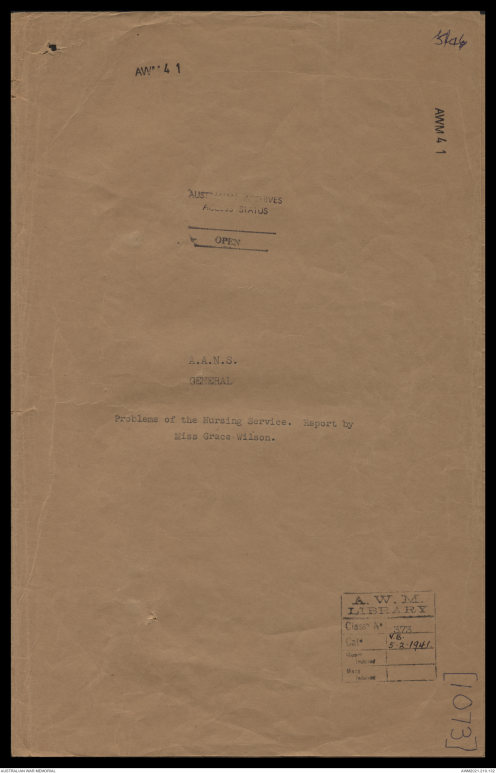
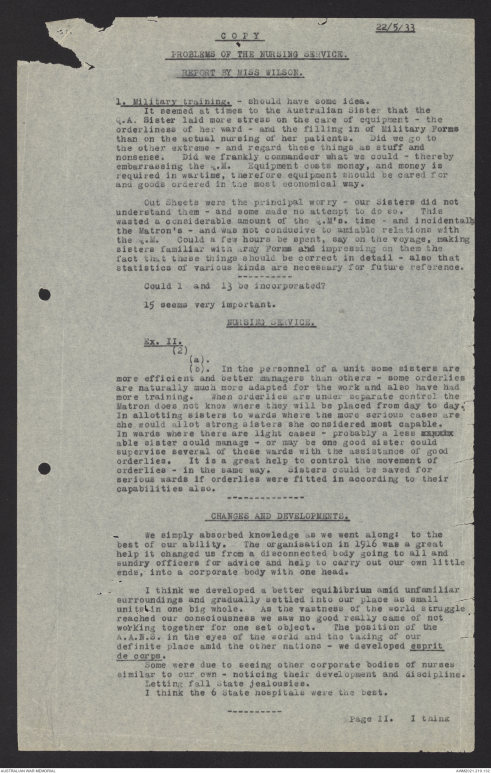
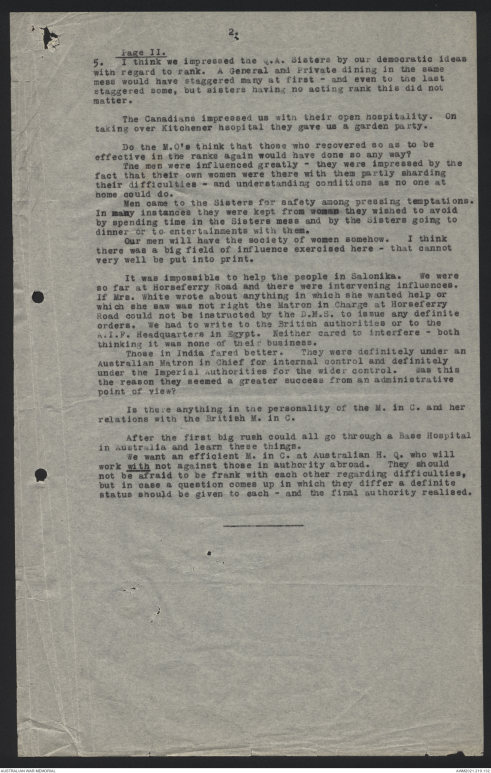
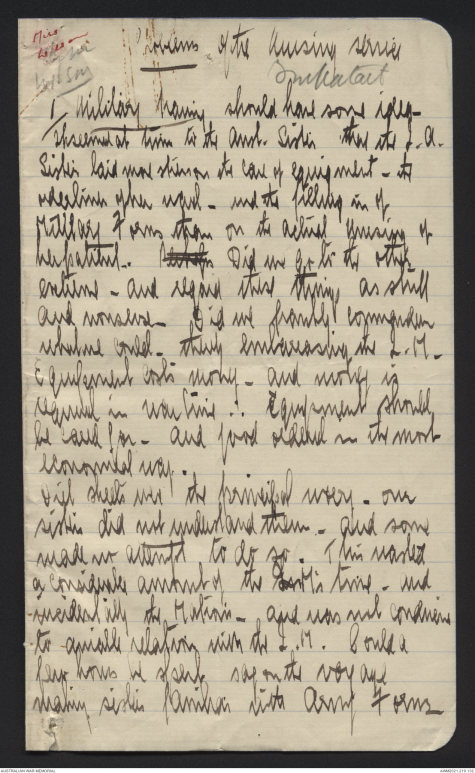
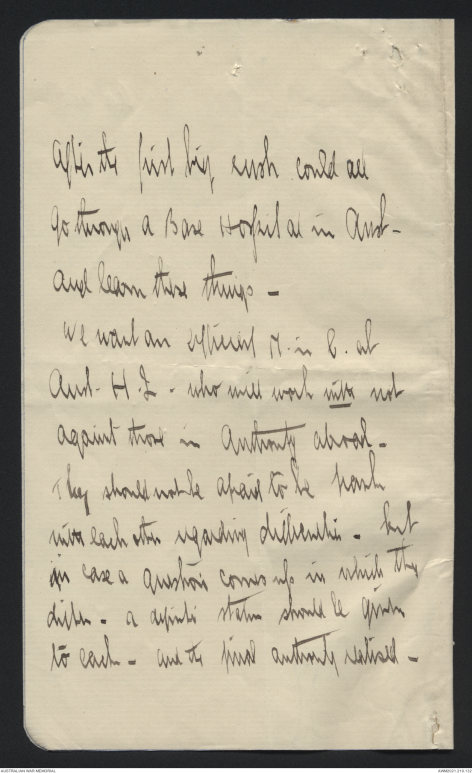
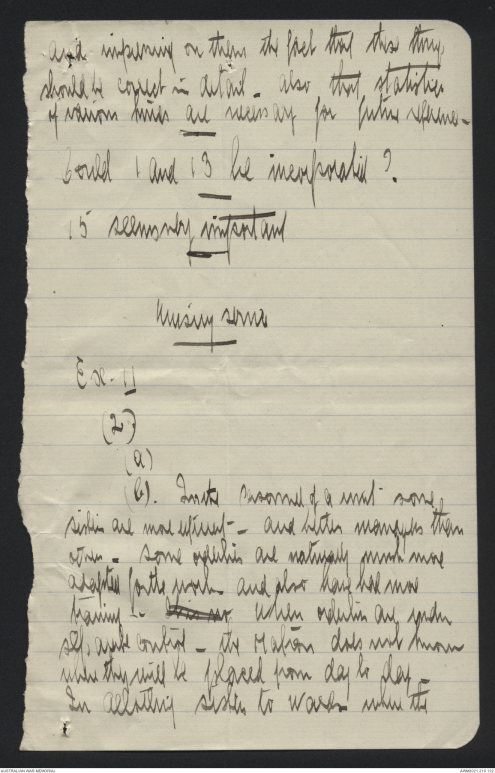
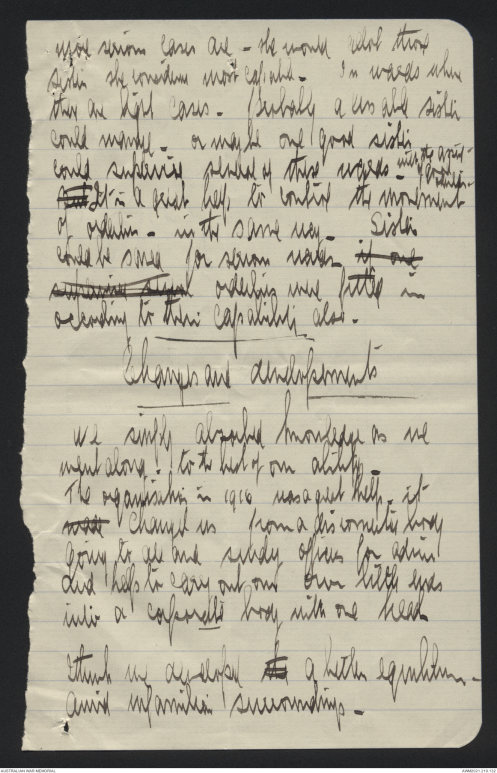
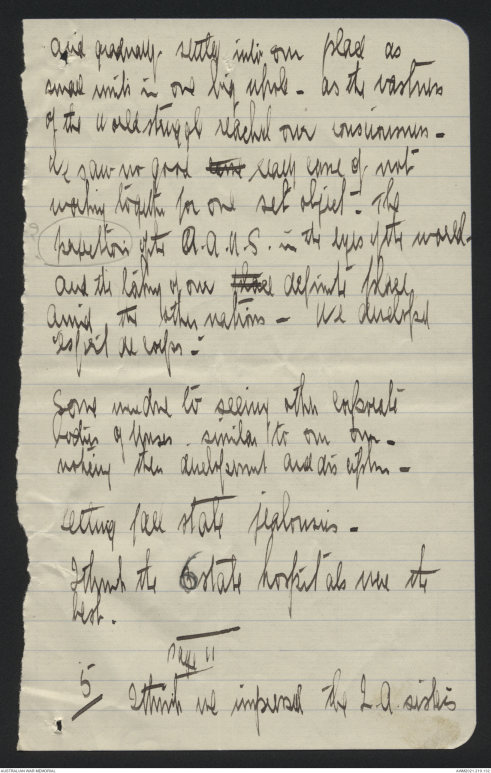
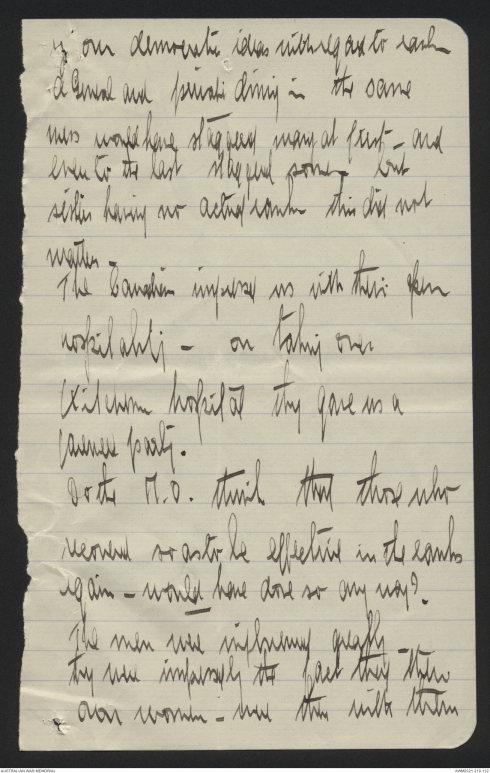
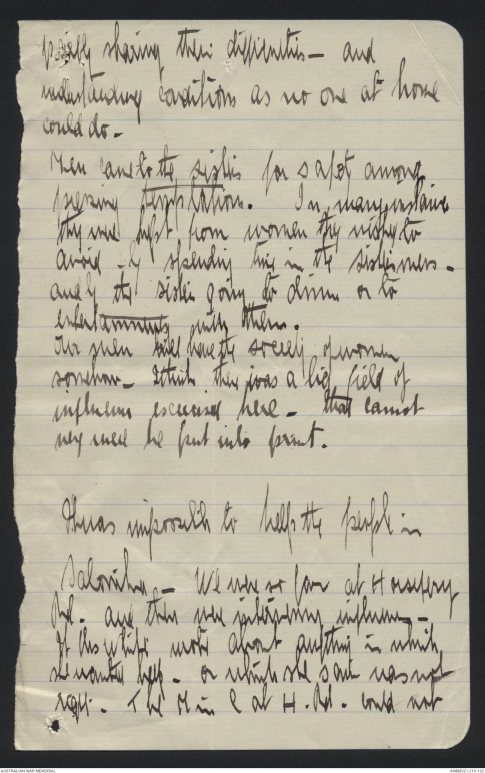
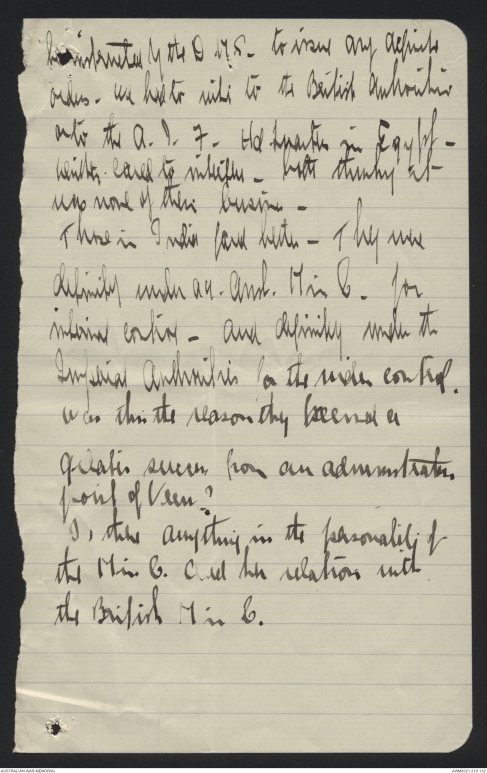
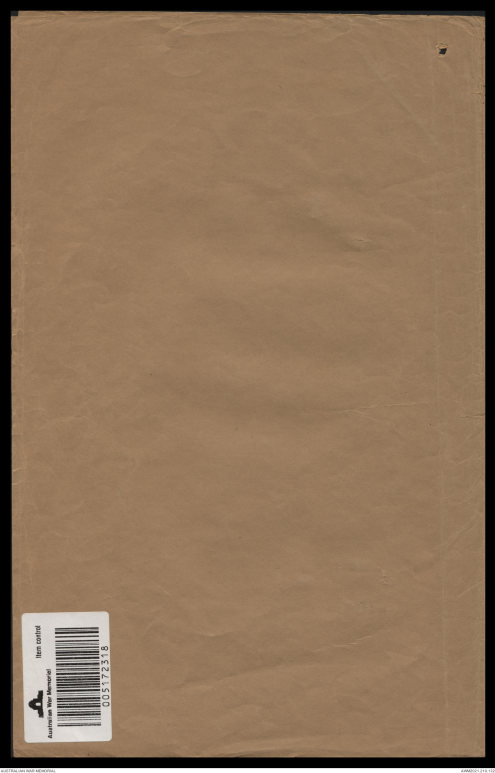
AWM 4 1
15/4/18
[*AWM 4 1*]
AUSTRALIAN ARCHIVES
ACCESS STATUS
OPEN
A.A.N.S.
GENERAL
Problems of the Nursing Service. Report by
Miss Grace Wilson.
AWM
LIBRARY
Clssn No. 373
Cat V.B. 5.2.1941
[1073]
22/5/33
COPY
PROBLEMS OF THE NURSING SERVICE.
REPORT BY MISS WILSON.
1. Military training. - should have some idea.
It seemed at times to the Australian Sister that the
Q.A. Sister laid more stress on the care of equipment - the
orderliness of her ward - and the filling in of Military Forms
than on the actual nursing of her patients. Did we go to
the other extreme - and regard these things as stuff and
nonsense. Did we frankly commandeer what we could - thereby
embarrassing the Q.M. Equipment costs money, and money is
required in wartime, therefore equipment should be cared for
and goods ordered in the most economical way.
Out Sheets were the principal worry - our Sisters did not
understand them - and some made no attempt to do so. This
wasted a considerable amount of the Q.M's. time - and incidentally
the Matron's - and was not conducive to amiable relations with
the Q.M. Could a few hours be spent, say on the voyage, making
sisters familiar with Army Forms and impressing on them the
fact that these things should be correct in detail - also that
statistics of various kinds are necessary for future reference.
Could 1 and 13 be incorporated?
15 seems very important.
NURSING SERVICE.
Ex. 11
(2)
(a).
(b). In the personnel of a unit some sisters are
more efficient and better managers than others - some orderlies
are naturally much more adapted for the work and also have had
more training. When orderlies are under separate control the
Matron does not know where they will be placed from day to day.
In allotting sisters to wards where the more serious cases are
she would allot strong sisters she considered most capable.
In wards where there are light cases - probably a less xxxxx
able sister could manage - or may be one good sister could
supervise several of these wards with the assistance of good
orderlies. It is a great help to control the movement of
orderlies - in the same way. Sisters could be saved for
serious wards if orderlies were fitted in according to their
capabilities also.
CHANGES AND DEVELOPMENTS.
We simply absorbed knowledge as we went along: to the
best of our ability. The organisation in 1916 was a great
help it changed us from a disconnected body going to all and
sundry officers for advice and help to carry out our own little
ends, into a corporate body with one head.
I think we developed a better equilibrium amid unfamiliar
surroundings and gradually settled into our place as small
units in one big whole. As the vastness of the world struggle
reached our consciousness we saw no good really came of not
working together for one set object. The position of the
A.A.N.S. in the eyes of the world and the taking of our
definite place amid the other nations - we developed esprit
de corps.
Some were due to seeing other corporate bodies of nurses
similar to our own - noticing their development and discipline.
Letting fall State jealousies.
I think the 6 State hospitals were the best.
Page II. I thing
2.
Page II.
5. I think we impressed the Q.A. Sisters by our democratic ideas
with regard to rank. A General and Private dining in the same
mess would have staggered many at first - and even to the last
staggered some, but sisters having no acting rank this did not
matter.
The Canadians impressed us with their open hospitality. On
taking over Kitchener hsopital they gave us a garden party.
Do the M.O's think that those who recovered so as to be
effective in the ranks again would have done so any way?
The men were influenced greatly - they were impressed by the
fact that their own women were there with them partly sharding
their difficulties - and understanding conditions as no one at
home could do.
Men came to the Sisters for safety among pressing temptations.
In many instances they were kept from women they wished to avoid
by spending time in the Sisters mess and by the Sisters going to
dinner or to entertainments with them.
Our men will have the society of women somehow. I think
there was a big field of influence exercised here - that cannot
very well be put into print.
It was impossible to help the people in Salonika. We were
so far at Horseferry Road and there were intervening influences.
If Mrs. White wrote about anything in which she wanted help or
which she saw was not right the Matron in Charge at Horseferry
Road could not be instructed by the D.M.S. to issue any definite
orders. We had to write to the British authorities or to the
A.I.F. Headquarters in Egypt. Neither cared to interfere - both
thinking it was none of their business.
Those in India fared better. They were definitely under an
Australian Matron in Chief for internal control and definitely
under the Imperial Authorities for the wider control. Was this
the reason they seemed a greater success from an administrative
point of view?
Is there anything in the personality of the M. in C. and her
relations with the British M. in C.
After the first big rush could all go through a Base Hospital
in Australia and learn these things.
We want an efficient M. in C. at Australian H.Q. who will
work with not against those in authority abroad. They should
not be afraid to be frank with each other regarding difficulties,
but in case a question comes up in which they differ a definite
status should be given to each - and the final authority realised.
[*Miss
Wilson
Miss
Wilson*]
Problems of the Nursing Service
Important
1 Military Training should have some idea.
It seemed at times to the Aust. Sister that the Q.A.
Sister laid more stress on the care of equipment - the
orderliness of her ward - and the filling in of
Military Forms than on the actual nursing of
her patients. xxxx Did we go to the other
extreme - and regard these things as stuff
and nonsense. Did we frankly commandeer
what we could - thereby embarrassing the Q.M.
Equipment costs money, and money is
required in wartime, therefore equipment should
be cared for - and goods ordered in the most
economical way.
Out sheets were the principal worry - our
sisters did not understand them - and some
made no attempt to do so. This wasted
a considerable amount of the Q.M's. time - and
incidentally the Matron's - and was not conducive
to amiable relations with the Q.M. Could a
few hours be spent, say on the voyage,
making sisters familiar with Army Forms
After the first big rush could all
go through a Base Hospital in Aust -
and learn these things -
We want an efficient M. in C. at
Aust H.Q. who will work with not
against those in authority abroad.
They should not be afraid to be frank
with each other regarding difficulties, but
in case a question comes up in which they
differ- a definite status should be given
to each - and the final authority realised.
and impressing on them the fact that these things
should be correct in detail. Also that statistics
of various kinds are necessary for future reference.
Could 1 and 13 be incorporated?
15 seems very important.
Nursing Service
Ex, 11
(2)
(a).
(b). In the personnel of a unit some
sisters are more efficient and better managers than
others - some orderlies are naturally much more
adapted for the work and also have had more
training. It is not When orderlies are under
separate control - the Matron does not know
where they will be placed from day to day.
In allotting sisters to wards where the
more serious cases are - she would allot strong
sisters she considered most capable. In wards where
there are light cases - probably a less able sister
could manage - or may be one good sister
could supervise several of these wards with the assist of good orderlies. But It is a great help to control the movement
of orderlies - in the same way. Sisters
could be saved for serious wards if not supervised xxxx orderlies were fitted in
according to their capabilities also.
Changes and developments
We simply absorbed knowledge as we
went along: to the best of our ability.
The organisation in 1916 was a great help itmade changed us from a disconnected body
going to all and sundry officers for advice
and help to carry out our own little ends,
into a corporate body with one head.
I think we developed the a better equilibrium
amid unfamiliar surroundings.
and gradually settled into our place as
small units in one big whole. As the vastness
of the world struggle reached our consciousness -
we saw no good came really came of not
working together for one set object. The
position of the A.A.N.S. in the eyes of the world -
and the taking of our these definite place
amid the other nations - we developed
'esprit de corps.'
Some were due to seeing other corporate
bodies of nurses similar to our own -
noticing their development and discipline.
Letting fall State jealousies.
I think the 6 State hospitals were the best.
Page II
5/ I think we impressed the Q.A. Sisters
by our democratic ideas with regard to rank.
A General and private dining in the same
mess would have staggered many at first - and
even to the last staggered some, but
sisters having no acting rank this did not
matter.
The Canadians impressed us with their open
hospitality - on taking over
Kitchener hospital they gave us a
garden party.
Do the M.O think that those who
recovered so as to be effective in the ranks
again would have done so any way?
The men were influenced greatly -
they were impressed by the fact that their
own women - were there with them
partly sharing their difficulties - and
understanding conditions as no one at home
could do.
Men came to the Sisters for safety among
pressing temptations. In many instances
they were kept from women they wished to
avoid by spending time in the Sisters mess -
and by the Sisters going to dinner or to
entertainments with them.
Our men will have the society of women
somehow. I think there was a big field of
influence exercised here - that cannot
very well be put into print.
It was impossible to help the people in
Salonika. We were so far at Horseferry
Rd and there were intervening influences.
If Mrs. White wrote about anything in which
she wanted help, or which she saw was not
right. The M in C at H. Rd. could not
be instructed by the D.M.S. to issue any definite
orders. We had to write to the British authorities
or to the A.I.F. Headquarters in Egypt.
Neither cared to interfere - both thinking it
was none of their business.
Those in India fared better. They were
definitely under an Aust M in C. for
internal control - and definitely under the
Imperial Authorities for the wider control.
Was this the reason they seemed a
greater success from an administrative
point of view?
Is there anything in the personality of
the M. in C. and her relations with
the British M. in C.
Item Control
Australian War Memorial
005172318
 Sam scott
Sam scottThis transcription item is now locked to you for editing. To release the lock either Save your changes or Cancel.
This lock will be automatically released after 60 minutes of inactivity.